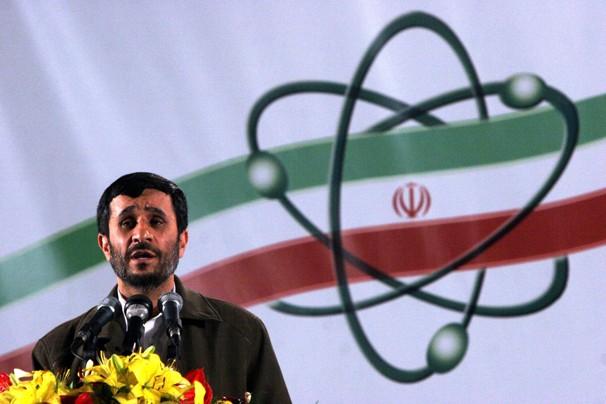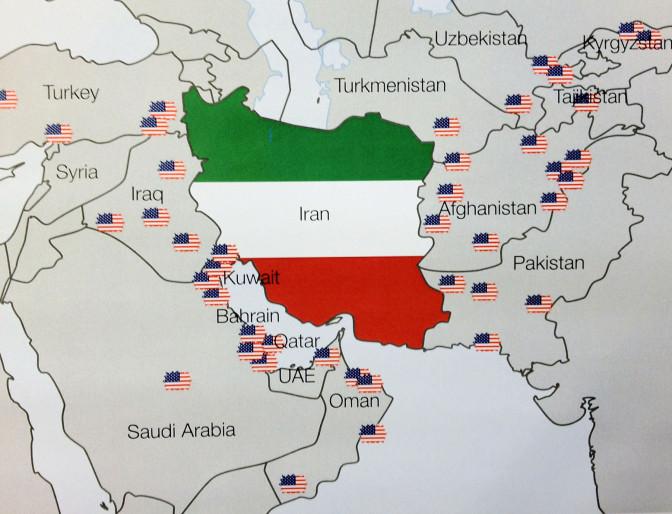
Iranian President Ahmadinejad speaking in Natanz. Whilst nuclear enrichment isn’t nuclear weaponry, would the latter be really that bad?
If the recent intervention in Libya taught dictators and those in the ‘axis of evil’ anything, then it would be that the only guarantor of state sovereignty is nuclear weapons.
The current debate around Iranian nuclear capability is based on whether or not Iran will build nuclear weapons.
However, the debate should be on whether or not Iran will use them. It doesn’t seem unlikely that Iran could produce nuclear weapons, not to forget that the Soviet Union produced such weapons out of nowhere with no domestic supply of uranium/plutonium.
Nuclear weapons preserved a delicate balance of power for nearly 50 years during the Cold War, avoiding another catastrophic with the deterrent threat of mutually-assured-destruction. The world’s two largest superpowers faced each other off in Europe, with the Berlin wall.
Of course, this will not be good news for the greater powers – from the United States and China to Russia; Iranian nuclear weapons will mean a new competitor. However, for global security, Iran could tip the balance in the Middle East to reach an arguably less violent stalemate.

A map of American bases near Iran.
Counterproductive Measures
In the US, there is a growing anger against Iran – arguably manufactured consent for the war. This prompts questions as to what America might actually do, to which there are several answers.
The first one would be to cripple Iran’s economy through sanctions, blockades, and import bans. This will have the added effect of a possible overthrow of the regime (along with a reasonable amount of Iranian deaths through economic woes).
Another option is to stage a full on attack, Iraq style. This would drag America down, but gives them the ability to destroy all nuclear infrastructure and leave the threat of invasion open to any future Iranian leaders wishing to delve into nuclear capability.
Carpet bombing and ‘gunboat’ diplomacy. This will produce exactly the opposite of what would be intended, Iran becoming a nuclear power (in order to fend off America).
A Different Approach?
Ignoring everything said prior, what if Iran really does give in to all of America’s demands? Well, in my opinion that would be a failure – because a one-sided deal will only exacerbate tensions and certainly wouldn’t last very long.
Stephen Walt sees two paths to an Iranian nuclear resolution, the first being:
The one we are currently on: The United States and its allies keep ratcheting up economic sanctions until the Iranian economy collapses, accompanied by a fair amount of human suffering and untold deaths due to economic hardship. At that point, the clerical regime either says “uncle” or gets overthrown. In either case, whoever is in charge in Iran subsequently agrees to abandon all nuclear enrichment, get rid of all their current stockpile of enriched uranium, and dismantle all their centrifuges, with compliance to be verified by the United States and the IAEA.
This worked on Qaddafi nearly a decade back, with sanctions and economic pressure making non-proliferation seem much more attractive. However, it is of no doubt that the Iranian government sees a link to the overthrow of Qaddafi and the protection not given by a nuclear arsenal which means that this approach is much less likely to work. So, Walt’s second approach is the pure military option:
The United States attacks Iran and destroys as much of its nuclear infrastructure as it can find. We also manage to convince Iran that we’ll keep coming back to repeat the job if they try to rebuild. In response, the clerical regime ignores the popular outrage that our attack would provoke and agrees to remain a non-nuclear power in perpetuity.
Both of these approaches could work, and may even have done so before, but what is the virtue of a one-sided deal that might be popular only in the US if it’s completely unsustainable?
In either of these approaches, the Middle East is going to have to deal with a whole new load of rightfully naffed-off Iranians. The majority of Iranians support nuclear enrichment – from opposition leaders and the public at large to the current government; if a deal is struck under any of the approaches Walt sees then (in his own words) the “concession will have been screwed out of them.”
What could end up resulting with this, is that the hardliners on both camps get what they want – the Iranians getting a bomb and the Americans getting full-scale military intervention.
To see this, all you have to do is empathise with the Iranians in this hypothetical scenario and compare yourself to other countries of the world. Why do countries like Israel (which is vehemently against the state of Iran), Pakistan, and India get nuclear weapons? If the foundation of international law is sovereignty and self-defence why aren’t they allowed nuclear weapons, let alone nuclear power? This is not withstanding Japan’s large reserves of plutonium, and the fact that they are always never more than a few months away from a new bomb and a new president.
Empathising with the Americans too, in this scenario, would help you understand the climate for war. If Iran gained a nuclear weapon after some sort of coercion, then it would predictably be seen as a step to retribution. It would not be unreasonable for a senior American official to quote the fictional West Wing POTUS, and say that they will “blow them off the face of the earth with the fury of God’s own thunder” for even thinking of threatening America.
Related articles
- Former Mossad Head Says Nuclear Iran is Not an Existential Threat ! (socioecohistory.wordpress.com)
- Nuclear Weapons and Security in 21st Century Asia (Muthiah Alagappa)
